Avoid These Retriever
Nutrition Mistakes
Nutrition Mistakes

Kyle Wintersteen, Managing Editor
Your duck dog is a canine athlete. He trains all summer, and then spends hunting season corralling winged Canada geese, breaking ice to reach downed mallards and conquering rolling waves en route to bluebills. Why then, would anyone feed a retriever like he’s some average Frisbee-fetcher?
A duck dog’s diet and feeding regimen are critical to success afield. If you’re committing any of these nutrition mistakes, you might be affecting your retriever’s performance — and possibly — his health.
Feeding in the Morning
There’s some evidence that feeding prior to exercise can induce a gastrointestinal bloat (i.e., a “flipped stomach”), but certainly it leads to discomfort and actually saps the dog’s energy.
“Research shows that a working dog shouldn’t eat in the morning before hunting or exercise,” said Karl Gunzer, Purina’s senior manager of Sporting Dog Programs. “It results in bloodflow being diverted for digestion, which really impacts the dog’s energy. Dogs also digest food more slowly than people, so the food remains in their stomachs longer than you may think.”
Gunzer, whose Labs have won more than 40 open field trial stakes and 60 derbies, advises feeding duck dogs once daily, always in the evening.
Feeding an Insufficient Fat/Protein Ratio
Forget carbohydrates. Duck dogs require the fuel and muscle maintenance provided by a high-fat, high-protein diet.
“Studies show that active retrievers are healthier when fed a high-protein, high-fat diet such as Purina’s Pro Plan Sport Performance (30 percent protein, 20 percent fat),” Gunzer said. “The protein helps maintain a lean body mass, support overall health and prevent muscle injury, while the fat provides energy.”
Dogs metabolize energy from fats far more efficiently than carbohydrates. Studies demonstrate that a high-fat diet benefits dogs during short bursts of activity, as well as endurance exercise. So, whether your Lab needs to nab a fleeing drake or he’ll double as an upland dog, he’ll benefit from a high-fat diet.
Switching to an Off-Season Diet
It was a terrific season with plenty of memorable retrieves, but now your dog will see some couch time. Time to change to a low-fat, weight-maintenance formula for the off-season, right?
Don’t be tempted. In addition to the stomach upset that can occur from dietary adjustments, your dog must consume a 30/20 diet for at least two months prior to hunting season to reap the benefits.
“Changing foods metabolically detrains your dog,” Gunzer said. “It takes the dog’s system about eight weeks to learn to process and optimally absorb a new food. So if you switch back to a performance diet in October, the dog won’t get the full benefit until December. If you’re concerned about your dog’s weight, it’s better to reduce the quantity of food offered.”
Free-Feeding
The once-common practice of free-feeding — allowing a dog to chow down throughout the day as he pleases — somehow persists. Free-feeding often leads to excessive weight, particularly for retrievers, and makes it easy to overlook potential issues such as decreased appetite.
“Or the dog may eat at the wrong time of day,” Gunzer said. “If the dog sneaks a couple cups of food before an afternoon duck hunt, that’s not an ideal situation.”
Failing to Monitor Weight
So, monitor your dog’s daily ration, and as importantly, his weight.
“It’s important to know your dog’s ideal body composition and weight, so you can maintain it by adjusting the amount you’re feeding,” Gunzer said. “The dog’s weight and need for calories can quickly be affected by how active it is.”
You should always be able to feel your dog’s ribs, covered in a thin layer of fat, and easily discern an upward sloping abdomen through visual inspection.
Offering Table Scraps
No, you wouldn’t normally feed table scraps. But admit it: After a frigid, late-season mallard hunt, aren’t you tempted to reward your dog — and boost his calories — with a bite from your plate?
“When dogs looks whipped, sometimes you just want to be nice and add some steak or a chunk of potato to their food,” Gunzer said. “But often, food scraps upset their digestive systems and lead to loose stools, which means they’re underutilizing food nutrients. If your dog has worked especially hard, just increase the nightly ration rather than supplement it.”
Offering Pond Water
Many people overlook taking water to a duck hunt for their dogs. After all, when you’re hunting waterfowl there’s generally water around. However, allowing your dog to drink from the surrounding environment sets a poor precedent.
“During the hunting months, if your dog drinks water from ponds and other sources, there’s not as big a chance of ingesting microorganisms,” Gunzer said. “But it can lead to a habit. And I always worry when training in the summertime about algae blooms and diseases like giardia in the water that can lead to diarrhea and quickly dehydrate a dog.”
So, take water to the hunt and offer it frequently.
“That’s important, even if the weather is cool and the dog’s been in the water all day,” said Gunzer. “If dogs hunt hard or hunt several days in a row, they can easily get dehydrated in a duck blind.”

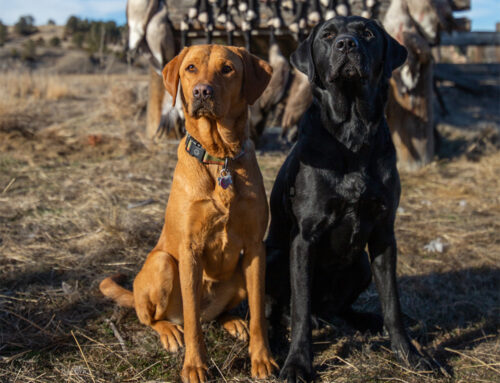
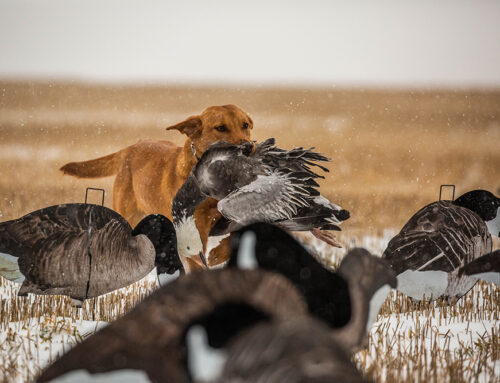
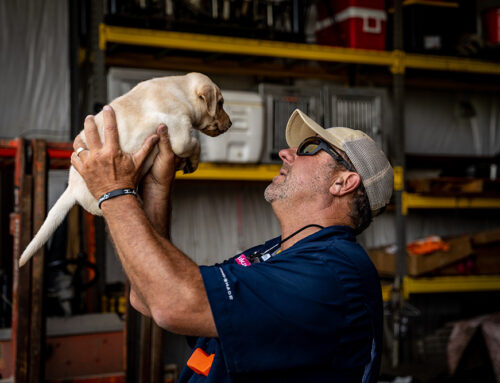
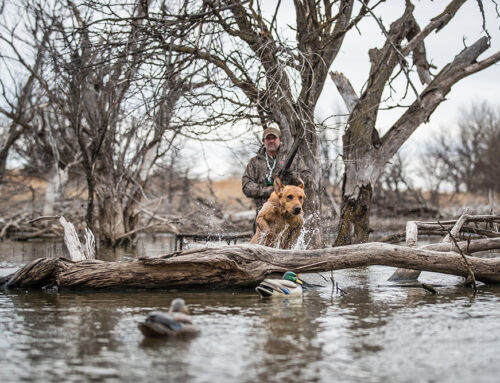
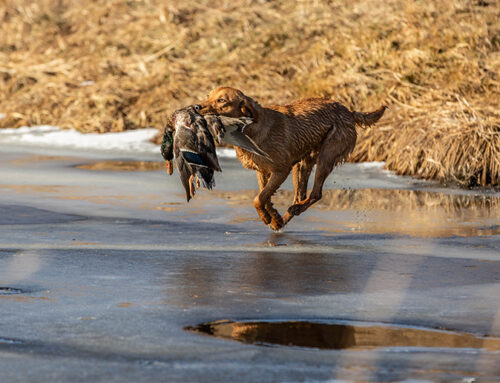
Leave A Comment